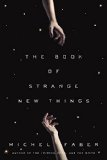Summary | Excerpt | Reading Guide | Reviews | Beyond the Book | Readalikes | Genres & Themes | Author Bio

A Novel
by Michel Faber
"Is there anything else on the menu?"
"Sure, lots of things."
"Then I'd order something else."
"You could still sit there and eat?"
"It would depend on what I was doing in these people's company in the first place."
"What if you disapproved of them?"
"I'd try to steer the conversation toward the things I disapproved of, and then I'd be honest about what I thought was wrong."
"You don't have a problem specifically with the duckling thing?"
"Humans eat all sorts of animals. They slaughter pigs, who are much more intelligent than birds."
"So if an animal is dumb it's OK to kill it?"
"I'm not a butcher. Or a chef. I've chosen to do something else with my life. That's a choice against killing, if you like."
"But what about the ducklings?"
"What about the ducklings?"
"You wouldn't feel compelled to save them? For example, would you consider smashing the glass enclosure, so they could escape?"
"Instinctively, I might. But it probably wouldn't do those ducklings any good. If I was really haunted by what I saw in that restaurant, I suppose I could devote my whole life to reeducating the people in that society so they would kill the ducks more humanely. But I would rather devote my life to something that might persuade human beings to treat each other more humanely. Because human beings suffer so much more than ducks."
"You might not think so if you were a duck."
"I don't think I would think much about anything if I were a duck. It's higher consciousness that causes all our griefs and tortures, don't you think?"
"Would you step on a cricket?" interjected one of the other questioners.
"No."
"A cockroach?"
"Maybe."
"You're not a Buddhist, then."
"I never claimed to be a Buddhist."
"You wouldn't say that all life is sacred?"
"It's a beautiful concept, but every time I wash, I kill microscopic creatures that were hoping to live on me."
"So where's the dividing line for you?" the woman rejoined. "Dogs? Horses? What if the restaurant was frying live kittens?"
"Let me ask you a question," he said. "Are you sending me to a place where people are doing terrible, cruel things to other creatures?"
"Of course not."
"Then why ask me these sorts of questions?"
"OK, how about this one: Your cruise ship has sunk, and now you're stuck in a life raft with an extremely irritating man who also happens to be homosexual . . ."
And so it went on. For days and days. So long, in fact, that Bea lost patience and began to wonder if he should tell USIC that his time was too precious to waste on any more of these charades.
"No, they want me," he'd reassured her. "I can tell."
Now, on a balmy morning in Florida, having earned the corporation's stamp of approval, Peter turned to face the driver and posed the question to which, in all these months, he hadn't been given a straight answer.
"What is USIC, exactly?"
The driver shrugged. "These days, the bigger the company, the less you can figure out what it does. Time was when a car company made cars, a mining company dug mines. It's not like that anymore. You ask USIC what they specialize in and they tell you things like . . . Logistics. Human resources. Large-scale project development." The driver sucked the last of the Tang through a straw, making an ugly gurgling sound.
"But where does all the money come from?" said Peter. "They're not funded by the government."
The driver frowned, distracted. He needed to make sure his vehicle was in the correct lane. "Investments."
Excerpted from The Book of Strange New Things by Michel Faber. Copyright © 2014 by Michel Faber. Excerpted by permission of Hogarth Books. All rights reserved. No part of this excerpt may be reproduced or reprinted without permission in writing from the publisher.
These are not books, lumps of lifeless paper, but minds alive on the shelves
Click Here to find out who said this, as well as discovering other famous literary quotes!
Your guide toexceptional books
BookBrowse seeks out and recommends the best in contemporary fiction and nonfiction—books that not only engage and entertain but also deepen our understanding of ourselves and the world around us.